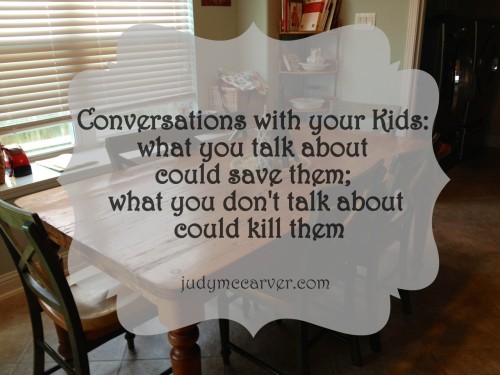Today I would like to introduce you to my friend Judy. She blogs over at JudyMccarver.com. She is a mom of teens and a very wise momma at that! Today, she is sharing the importance of conversations with our children, especially in their more vulnerable teenage years. Talking with your children is one of the most important things you can do as a parent. Thank you for being here today Judy!!

When is the last time you had a conversation with your son or daughter? A real one. Not a superficial conversation about after school pick-up or football practice times, or “I’ll be running late so start dinner without me,” or anything to do with the logistics of running a household-but a real conversation. What happened in your day? What could you have done differently or what went well? What’s the importance of treating others with respect? Summer vacation is soon here; how do you plan to balance leisure activity with serving in your community? Conversations regarding the implications of those who choose to be sexually active early. Planning to be financially responsible and avoiding debt!
These are a just a few “life saving” conversations. Obviously, not all of our hours can be devoted solely to these discussions. We are all busy. But you better believe that not allotting time in your busy schedules for these dialogues could be a powerful measuring stick for their future success and even their safety. A recent report by TIME magazine reveals that one in five women will be the victim of a sexual assault during college. (Time Magazine May 16, 2014) No, I did not say one in five women might be victims of sexual assault in college. Rather, one in five women will be victims of sexual assault in college. What does this mean to you as a parent of a girl or boy? Well, it might interest you to know that the alleged victims are mostly freshman, (think 18 or 19-year-old girls) and the alleged perpetrators are generally repeat male offenders who are students themselves at the college, not the stereotypical perpetrator: a stranger lurking in the bushes on campus. I refer to this article just as one example of the pervading need to talk with our kids. I wonder how many of those “1 in 5″ girls who are sexually assaulted had a literal discussion with their parent(s) about the hazards of attending drinking parties at college and/or a set of instructions on what to do and what not to do if you insist on attending such a party?
What do we talk about in these “growing up years” at home? We talk about everything under the sun. We talk about boys, girls, dating, school, expectations, coping with change, practicing manners, character, relationships, life and death, how to treat the opposite sex-everything! It’s surreal to me to think or believe that simple (but substantial in content) conversations peppered throughout their childhood could save my child’s life, keep her from being sexually assaulted, or maybe save her from bankruptcy.
Here’s a few excerpts of such conversations:
1. Never have revolving debt. Pay your bills in full each month. Other than a mortgage, the majority of debt drains your income and your financial resources, including your retirement savings.
2. As a general rule, don’t attend parties in college with a bunch of strangers and a lot of alcohol. That is a lethal combination. And if you insist, you better never accept a drink from another person. Know that if you get drunk, your odds of being sexually assaulted or even raped will greatly increase.
3. In your every day interaction with others, remember that everyone, including you, is a human being, and deserves respect. “Seek first to understand, then to be understood.” (Stephen Covey, “The Seven Habits of Highly Effective People.”)
4. Don’t walk alone through a deserted parking lot at night and if you must, walk with purpose, no texting, have your keys out ready to get in the car and go.
5. And the possibilities for “life saving” conversations go on and on.
So often, we parents lead lives that are very self-serving. Why do I think this? Because most of our time is spent centered around our children and their activities. That’s the irony of the whole thing. We are with our kids a lot. But we are not really with them. We are not necessarily discussing with them what is important. Most of our commitments revolve around two things: our jobs (which pay the bills) and the daily orchestration (sometimes chaos) of getting our kids to their activities. There’s little margin in such busy schedules for important family events such as eating dinner around the table, family game night, attending church together, or volunteering together. Unfortunately statistics show that oftentimes these “life saving” conversations happen in these latter places. In a report by Health.com in 2011, (and a million other studies) a strong correlation was found to exist between family dinners and a teenager’s propensity to abuse drugs or alcohol. Furthermore family meals eaten together at home are also connected to better report cards among teenagers and higher rates of high school graduation. One researcher said “Parental engagement fostered at the dinner table can be a simple, effective tool to help prevent drug abuse.
Family meals give children an opportunity to have conversations with adults. In a study in 2010 by A.C. Nielsen Co., it was reported that the “average parent spends 38.5 minutes a week in meaningful conversation with their children.” Is that enough time to have these important “life saving” conversations? EMarketer.com reported in March 2011 that 54% of teens ages 13-17 use select media and devices (video games, computers, phones, and social networking) 30+ hours a week! 14% of this age group use electronic media 20-29 hours a week, and 19% of this age group is immersed in electronic media 10-19 hours a week! Today’s teenagers are spending almost as much time watching and surfing media devices as they might one day be expected to spend on a job! But whose teaching them the dangerous implications of so much time spent on media? Whose having that conversation with them? And if they are spending this many hours glued to a screen, how can they possibly be spending quality time with parents and siblings and having meaningful conversations with them?
It’s time for us as parents to make hard decisions about our family schedules, our children’s activities, and our words. What are we going to say to them now while the stakes are low? Right now they are housed inside the relative comfort and safety of our homes, but sooner than later, they will be out of our eyesight, out of our reach and out of our comfort zone. What are we doing to prepare them for functioning in a world that indeed will not care nearly so much for their health and wellbeing as we do? How are we preparing them to be safe and successful on their own? No, of course, there are no fool-proof ways of preparing your children for life on their own. No fool-proof ways of ensuring their safety. But we can do better than 38 minutes a week. Time with our kids is better spent eating around the table, playing a board game, reading with them, or doing leisure activities together-than it is in front of the television. Routing them from activity to activity is important and necessary. But this is an unlikely time and place for meaningful conversation to happen. It could. But sometimes we just have to be with them and give one another undivided attention. Prepare them for the inevitable events of life with your words. Prepare them with practical conversations. Be intentional about family meals, vacations, and volunteering together. Get on your calendars and schedule it like you do everything else. Their lives just might depend on it.
 Judy is a married mother of three teenage girls. Her husband is retired from 23 years service in USAF and now flies for UAL. They lived in Germany for 4 years and two years ago returned to the states settling in Houston. Judy was an agent with DEA for 7 years before resigning to parent full time. Since them she has enjoyed teaching and whenever possible speaking to women’s groups or other organizations. She has consistently coordinated and coached small groups at her church of attendance. She has a passion for teaching practical applications for success in marriage, parenting, and ministry. She blogs at judymccarver.com
Judy is a married mother of three teenage girls. Her husband is retired from 23 years service in USAF and now flies for UAL. They lived in Germany for 4 years and two years ago returned to the states settling in Houston. Judy was an agent with DEA for 7 years before resigning to parent full time. Since them she has enjoyed teaching and whenever possible speaking to women’s groups or other organizations. She has consistently coordinated and coached small groups at her church of attendance. She has a passion for teaching practical applications for success in marriage, parenting, and ministry. She blogs at judymccarver.com

[…] Guest Post Conversations with your kids […]